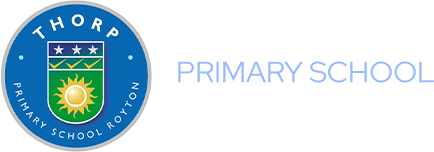Curriculum
Curriculum Statement
Our curriculum is rooted in a strong belief of equality for all pupils and is therefore designed to be ambitious for all. Expectations are high, ensuring that pupils with SEND and those who are disadvantaged apply what they know. We value a knowledge rich curriculum underpinned by carefully planned and sequenced units of work to enable cumulative knowledge and effective learning. We have discrete units of work for each subject area so that we can ensure excellent coverage of the National Curriculum and Early Years Curriculum. The curriculum is broad and balanced and offers a wide range of curricular activities involving visits out of school and visitors to school, to enhance learning and extend pupils’ cultural capital.
Curriculum Intent
At Thorp Primary School, our children have access to a broad, balanced, creative and coherent curriculum that prepares them to be school ready, work ready and life ready for the 21st century and raises aspirations. Our curriculum ensures they are equipped with the knowledge, skills and attitudes they need to become well-rounded individuals and lifelong learners. Our curriculum includes not only the statutory requirements of the National Curriculum but also the wide range of extra-curricular activities that the school organises to enrich the experiences of the children. It also includes the ‘hidden curriculum’, or what the children learn from the way they are treated and expected to behave. At Thorp we support children to grow into positive, responsible people, who can work and cooperate with others.
We want the pupils of our school to be confident: readers, writers, mathematicians, scientists, historians, geographers, musicians, artists, linguists, theologists, athletes, designers and technologists. Our curriculum has been designed with a clear intent to:
● meet the statutory requirements of the National Curriculum 2014.
● provide a broad and balanced curriculum that meets the needs of all of our pupils and reflects the local context, where appropriate.
● enable all our pupils to make progress in their learning, achieve their full potential and aim high.
● support the acquisition of knowledge and vocabulary
● ensure reading is given the highest priority across all aspects of the curriculum in order to develop fluency, accessibility and a love of reading within this school.
● prepare pupils for life in modern Britain and beyond Thorp Primary School and its locality.
● develop the pupils’ understanding, appreciation and celebration of difference – culturally and socially (locally, nationally and globally) . This is purposeful in the recognition of the mono culture demographic of the school. Thus enabling pupils to be reflective, empathetic individuals who will become responsible and effective contributors to society
● develop building learning skills (including resilience, confident communication)
● engage, inspire and hook pupils into their learning through a wide range of first hand experiences - providing pupils with memorable and rich opportunities which adds value and further promotes cultural capital.
Curriculum Implementation
At the heart of our curriculum are the core subjects of English, Mathematics and Science. We also value our wider curriculum, covering all other National Curriculum subjects and these foundation subjects are taught as discrete subject specific units/topics of learning but make tangible cross-curricular learning links which are meaningful where appropriate, relevant and help to secure prior learning or develop learning further.
Long term curriculum overviews outline how the breadth of the National Curriculum will be taught. Teachers use the long term curriculum overviews and subject progression documents to ensure medium term planning is sequential and clearly identifies the key knowledge pupils will be taught. Progression of knowledge is carefully planned, ensures learning builds effectively over time and is representative of themselves, whilst providing opportunities to understand similarities and differences from themselves locally, nationally and globally.
Our teaching is rooted in evidence-based research. Teachers are self-reflective and use this to enhance their teaching skills and strategies to help raise standards across the full breadth of the curriculum. Teachers have excellent knowledge of the subjects they teach and this is supported through sequential schemes of work, which have been carefully designed to build on pupils’ prior learning. Subject leaders provide any additional support required in relation to their subject specialism.
Assessment is designed thoughtfully to shape future learning. It is not excessive or onerous and is part of the day to day working practices of the classroom. Teachers ensure that pupils embed key knowledge in their long term memory by providing opportunities to revisit prior learning at the start of each lesson. Day‐to‐day, on-going assessment is a crucial method of assessment which provides instant feedback to the teacher and ensures progress within every lesson. Strategies such as assessment for learning are used in all lessons. These provide a clear picture of a child’s level of understanding and, ensure that teachers can quickly assess when a child does not understand and needs greater support. Lessons should be flexible enough to allow teachers to adapt to the needs of the child. All forms of assessment are also used to inform planning for subsequent lessons. Pupils are formally assessed three times a year (summative assessment) although ongoing formative assessment supports learners throughout the teaching and learning cycle. These end points are key to knowing whether pupils have been successful.
Curriculum Impact
From their different starting points, all children (including those with SEND or from disadvantaged backgrounds) will make good progress academically, emotionally, creatively, socially and physically. When measuring curriculum impact we also consider if the pupils leave Thorp Primary School well-rounded individuals who embody our values and carry with them the knowledge, skills and attitudes which make them lifelong learners and valuable future citizens.

OUR SOCIAL WALL